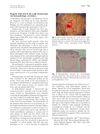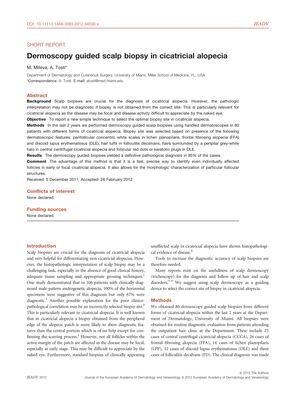TLDR Using dermoscopy to guide scalp biopsies is an effective way to diagnose cicatricial alopecia.
The document described a study where 80 patients with cicatricial alopecia underwent dermoscopy-guided scalp biopsies over a 2-year period. This technique involved selecting biopsy sites based on dermatoscopic features specific to different types of cicatricial alopecia. The study found that this method yielded a definitive pathological diagnosis in 95% of cases (76 out of 80 patients). The conclusion was that dermoscopy-guided scalp biopsy is an effective and precise technique for identifying affected follicles in early or focal cicatricial alopecia, which can enhance the accuracy of diagnosis and the understanding of the disease's morphology. However, the study lacked a control group for comparison, which was acknowledged as a limitation.
 60 citations
,
September 2010 in “Journal of the American Academy of Dermatology”
60 citations
,
September 2010 in “Journal of the American Academy of Dermatology” Small white dots on the scalp seen with a dermoscope correspond to sweat ducts and vary with different hair disorders.
 31 citations
,
April 2010 in “British journal of dermatology/British journal of dermatology, Supplement”
31 citations
,
April 2010 in “British journal of dermatology/British journal of dermatology, Supplement” Frontal fibrosing alopecia can cause sudden hair loss on limbs, similar to scalp hair loss.
 33 citations
,
January 2010 in “Case reports in dermatology”
33 citations
,
January 2010 in “Case reports in dermatology” Dermoscopy helps diagnose frontal fibrosing alopecia by distinguishing it from other hair loss conditions.
 170 citations
,
December 2009 in “Histopathology”
170 citations
,
December 2009 in “Histopathology” The conclusion is that accurate diagnosis of different types of hair loss requires good teamwork between skin doctors and lab experts.
 179 citations
,
December 2004 in “Journal of The American Academy of Dermatology”
179 citations
,
December 2004 in “Journal of The American Academy of Dermatology” Some postmenopausal women with frontal fibrosing alopecia stopped losing hair with finasteride treatment, hinting at a possible hormonal cause.
 309 citations
,
May 1993 in “Journal of The American Academy of Dermatology”
309 citations
,
May 1993 in “Journal of The American Academy of Dermatology” Horizontal scalp biopsy sections effectively diagnose and predict MPAA, with follicular density and inflammation impacting hair regrowth.
 1 citations
,
December 2021 in “Annals of the College of Medecine”
1 citations
,
December 2021 in “Annals of the College of Medecine” Alopecia areata shows various signs on the skin that aid in diagnosis and prognosis, with certain features indicating more severe disease.
 February 2021 in “Cureus”
February 2021 in “Cureus” A woman's hair loss was initially misdiagnosed as scarring hair loss but was actually a treatable autoimmune hair loss.
2 citations
,
December 2011 in “[Thesis]. Manchester, UK: The University of Manchester; 2011.” Immune system failure in hair follicles causes lichen planopilaris, leading to hair loss.










